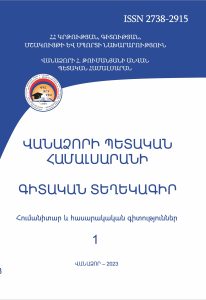“The Europe” Weekly on the Danish-Prussian War
Scientific Proceedings of Vanadzor State University Humanitarian and Social Sciences (ISSN 2738-2915)
2023 vol 1
“The Europe” Weekly on the Danish-Prussian War
Feliks Movsisyan
Summary
 Key words: Schleswig, Holstein, Denmark, Prussia, war, German Union, armistice, Frankfurt Parliament, “The Europe”
Key words: Schleswig, Holstein, Denmark, Prussia, war, German Union, armistice, Frankfurt Parliament, “The Europe”
German Union unfolded in the duchies of Schleswig-Holstein, which turned into the Danish-Prussian war. It found its response in the Armenian press of the time, as well as in “The Europe” political weekly of the Mkhitaryan Congregation in Vienna. The Mkhitaryan Congregates considered the comprehensive representation of the political events the main task of their newspaper; so that readers would be able to evaluate the facts objectively. Simultaneously, the staff of the weekly sought to cover the course of the Danish-Prussian war with “gravity, calmness, choice and distinct style”.
The Mkhitaryans considered the King’s desire to constitutionally unify the duchies with Denmark as the main reason for the German Schleswig-Holstein duchies to rise and take up arms. They also knew that Schleswig-Holstein was struggling to join the German Union. The reporters of “The Europe” noticed that the Danish-Prussian war had gone beyond the scope of the conflict between the two states and had acquired Pan-European significance. According to the Mkhitaryans, the Danish-Prussian war violated the decision of the Vienna Assembly of 1815 to maintain political balance in Europe. That’s why the leading European countries were trying to stop the war as quickly as possible and sign a truce. The weekly also stated the fact that the European states, seeking a truce, pursued their own interests. “The Europe” presented the terms of the armistice, discussed its reaction in the Frankfurt Parliament and the ratification of the armistice. The weekly called the participants of the September events “rioters”.
The Mkhitaryans noted that the population of the duchies didn’t want to obey Denmark, against which they resumed the war after the expiration of armistice. The Mkhitaryans didn’t try to praise any of the parties in the conflict. They didn’t approve their struggle either. Understanding the goal of the struggling sides, the Mkhitaryans commented on their struggle from the positions of impartiality and neutrality.
